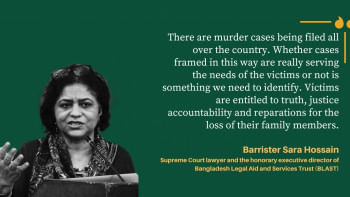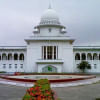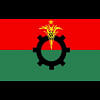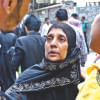Dubious cases will only hamper justice

Amid concerns about the dubious nature of many cases filed over the killing of protesters during the July-August uprising—and the risk that it poses to the chances of justice—a report in this daily has brought to the fore six instances where the killings took place in the capital, but most of the accused were found to be residents of remote districts and upazilas. Given the country's situation during those tumultuous days, there is little chance that the accused listed in these cases could have been present at the crime scene.
One case filed by Ayesha Begum on August 28 accused 50 people from Cumilla's Chandina of killing her husband, Muhammad Habib. He was fatally wounded on July 20 at Dhaka's Kadamtali area when police and Awami League men opened fire on protesters. Ayesha told this daily that her husband's friend, who hails from Cumilla, prepared the list of accused, and that she just signed the complaint. In another case, Mirazul Islam's father filed a case against 36 residents of Lalmonirhat, including three former lawmakers of the district, although Mirazul was shot in Jatrabari on August 5 and died three days later from his injuries. No policemen or AL members seen by the eyewitnesses were made accused in the case.
We have written about the pitfalls of filing false cases with fabricated FIRs in this column before. These cases, aimed at harassing political rivals and with no credible evidence against the accused, are less likely to pass the initial stage of trial. As a result, the victims killed during the uprising as well as their families might not get justice. Although the police headquarters on September 10 issued a directive ordering officers to drop the names of individuals against whom there is no evidence of perpetrating the corresponding crime, it is important that primary investigations of these questionable cases are expedited to ensure that innocent persons are relieved without delay.
The interim government should also heed experts' suggestions about compiling and providing the list of dubious cases to the Supreme Court authorities so that the latter can issue necessary directives. The other issue that should be looked into is the role of investigative officers in filing these cases. They should be held accountable for their role in falsely implicating innocent individuals both before and after August 5. We cannot let political rivalries, sloppy police work, or the culture of appeasing power get in the way of ensuring justice for the martyrs of the mass uprising.
Follow The Daily Star Opinion on Facebook for the latest opinions, commentaries and analyses by experts and professionals. To contribute your article or letter to The Daily Star Opinion, see our guidelines for submission.


 For all latest news, follow The Daily Star's Google News channel.
For all latest news, follow The Daily Star's Google News channel. 








Comments